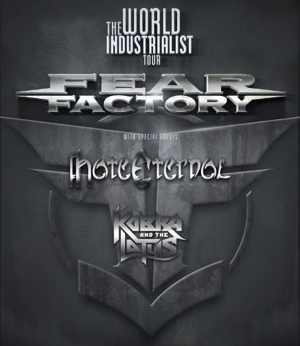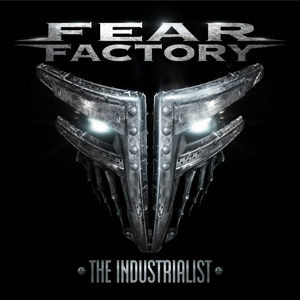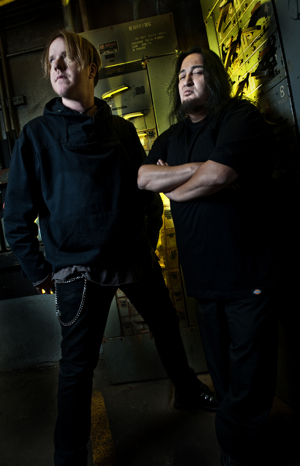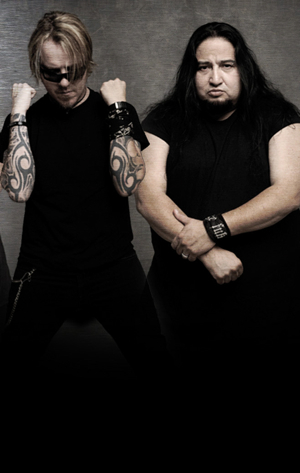By Andrew Bansal
 American modern metal greats Fear Factory released their eighth studio album ‘The Industrialist’ in June last year via Candlelight Records, amidst a largely positive response from fans of the band. They went on a massive European tour, and did shows in many places in Asia, Australia and South America, and now they are gearing up for their first proper North American touring run in support of ‘The Industrialist’ with opening acts Hate Eternal & Kobra And The Lotus. Earlier today, I had the pleasure of chatting with vocalist Burton C. Bell, and we discussed the band’s recent tours, the lyrical concepts behind The Industrialist, the use of programmed drums, future plans, his vocals, and more. Check out what the ever-insightful Burton had to say about these things.
American modern metal greats Fear Factory released their eighth studio album ‘The Industrialist’ in June last year via Candlelight Records, amidst a largely positive response from fans of the band. They went on a massive European tour, and did shows in many places in Asia, Australia and South America, and now they are gearing up for their first proper North American touring run in support of ‘The Industrialist’ with opening acts Hate Eternal & Kobra And The Lotus. Earlier today, I had the pleasure of chatting with vocalist Burton C. Bell, and we discussed the band’s recent tours, the lyrical concepts behind The Industrialist, the use of programmed drums, future plans, his vocals, and more. Check out what the ever-insightful Burton had to say about these things.
Your latest album ‘The Industrialist’ came out last June and you’ve been doing a lot of touring ever since. How’s it been overall and how are the new songs going over live?
Everything has gone really well! The album has been received very well by fans and critics, and that was very pleasing for me. Live, once the tour really started after the release of this record, we really fell into the machine of playing these songs and they really worked out well. The live versions of them were really cool and it translated well to the fans. So yeah, everything’s going great. It’s fun to play these songs live. They have a really good vibe and they fit in well with the rest of our repertoire.
I spoke to Dino about the making of this album last year, and he said that he used programmed drums to create the drum parts for the record. So, when you actually went out there and played it live, did it take a couple of shows to adjust with the live drummer?
Well yeah, before we actually hit the road with the live shows we rehearsed for quite a while with our drummer Mike Heller, and he’s an excellent drummer. He plays everything that is on the album. While writing, when Dino creates a riff or a pattern, it’s a rhythm pattern which has a very mechanical aspect to it, so therefore a drummer is able to play it if they’re capable of doing it. Mike Heller can do it. So after the first couple of shows, everything just worked. Our bass player Matt DeVries is actually a guitar player. He was in Chimaira, and he’s an excellent bass player too. That’s what the bass does, to follow what the guitar is doing. So a guitar player that plays bass is perfect for us.
Exactly, man. Is MIke Heller going to be your touring drummer, at least for the time being?
Absolutely! As long as he wants to stay with us (laughs)
 Right, so the thing that surprised me most was, you haven’t really done too many US shows after the album came out. According to my knowledge you’ve done only 16. Now of course you’re going out on a full US tour, but why has it taken so long to do a US tour for the album?
Right, so the thing that surprised me most was, you haven’t really done too many US shows after the album came out. According to my knowledge you’ve done only 16. Now of course you’re going out on a full US tour, but why has it taken so long to do a US tour for the album?
That’s a really good question, but I really don’t know. We did just one tour for this album in the States and we kept it really short. I’m just going to assume that our main market is Europe and outside the US. Times are tough everywhere. The economy is not doing well, and for Fear Factory we are rebuilding. A lot has happened with the band over the past few years so we are still trying to rebuild our grassroots by touring. We haven’t done much of it in the United States for this record but things will change. We have 40 shows on this tour coming up and we’re playing a lot of smaller towns that we haven’t been to in a while, some towns we’ve never been to. We’re just going to try and saturate what we’ve missed, and hopefully it translates to ticket sales. Hopefully people will want to see us (laughs).
I guess it was just a case of you getting better offers for tours outside of the US last year.
Yeah, that’s very true. The record came out last year in June, and that right there is the height of the summer festivals in Europe. So we just spent a lot of time in Europe last year.
And I think you also do well in Australia. I’ve noticed that you go there pretty frequently.
Yeah, we have been to Australia quite frequently. We’re one of the bands that have done very well there. We’ve probably been there most out of all bands in our genre over the past twenty years! The fans really go for us down there. We’ve played a lot of shows, and Australia does really well for us.
Coming to the lyrical concept of the album, how much time did you spend on it this time?
Before we go into the studio to write, I start focussing on what I’d like to achieve or what I’d like to write about. I put my mind into the Fear Factory mode and start taking social issues, world issues, and start putting it into a different context like a science fiction writer would do. The context is moving it forward, trying to put it into a different perspective. That’s what I find most science fiction writers doing. They write about their current time and moving forward. So I look at technology and innovations, and sciences all over the different types of genres from space to medical to cloning technology to biotechnology. I read all about it because I just find it fascinating. It’s what the world is all about these days, and it’s what the world is coming to. So I really focus on how it’s affecting the social structure of our times. Then I just start writing ideas down, seeing words and taking them down, or seeing phrases, and when it comes to writing lyrics, this time around we would listen to a riff and I would just go through my book and see what would fit. It was like, ‘Hey, this is what I’m feeling with this song’ and it would just come out. It was really almost like kismet. It was all coming together so well that the whole story just kind of fell into place.
 With a concept like this usually what happens is, the concept is written first and the music follows. Was that the case with you on The Industrialist too?
With a concept like this usually what happens is, the concept is written first and the music follows. Was that the case with you on The Industrialist too?
Yeah, the concept and the lyrics were influencing the structures of the songs and the sonic concept of the music itself. It was a really good combination of writing this time around. It felt really good, and the fact that we were using drum programming really simplified the matter so much more. We really became that industrial metal band we always wanted to be, because in the past we’ve used live drums to record but when does a live drummer stop being a live drummer? As soon as pro-tools came into the scene, the first time we used them was on the Digimortal album. Raymond recorded all the drums and then the pro-tools engineer went in and literally moved every hit that he did to make it precise, and changed every sound. So we were like, ‘Well, that was kind of a waste of time!’ (Laughs) So we just realized that if we were going to just do that, why don’t we just program it? Because programming is basically what we’re doing anyway. So that process really enabled us to write the record in a very free way. There was this freedom to change songs and to rearrange an arrangement, and to really implement ideas that we thought could never be done. It was so easily done and we were like, ‘Wow, this is how we should be writing forever!’ (Laughs)
Talking of your vocals, on the previous album Mechanize I think you explored a little bit of the deeper and cleaner side of your vocals more, on songs like Final Exit and all that. Was this album more natural and easier in that regard? You don’t have so much of that stuff on this one.
Yeah, on Mechanize there was a lot to prove with the band in general, so we wanted to really come out with something almost cosmic. But this time around for The Industrialist it was a more natural process. I think it is totally a true Fear Factory album because Dino and myself have always been the main proponent of Fear Factory, and with just Dino, myself and Rhys [Fulber, producer] working together, we really had the flow going so smooth. So yeah, it was easy, it was natural and vocally, I knew what I had to do. The inspiration came, and when I felt it that’s what we did. The vocals that you hear on the record are the true inspiration of what we felt at that time. The vocals aren’t run into the ground, and not edited. For instance, I didn’t record and re-record two or three different demos like we had in the past and the vocals changed every time. This time that’s not the case and you hear the true inspiration in the vocals, and the spark of creativity that I first felt upon hearing the music. So we went with it.
That’s very interesting, man! So, when you’re on tour, are you one of those guys who save the vocals by not talking when you’re not on stage, and stuff like that?
Not too much. I talk (laughs). You have to talk! But I’m fairly soft-spoken to begin with. I’m not one to be walking around and yelling at the top of my lungs all day long. I talk normally and I don’t push myself. I try to enjoy myself on tour. I like to have a couple of glasses of wine after a show, may be a couple of beers. I like to drink, you know, I’m a social drinker. On days off I enjoy myself and may be have a few more beers. One thing I learned on this part tour in Europe when we were out with Devin Townsend Project, it was a really brutal tour and it got to a point where it was just like, I had to do something to my regular program. I had to basically deprogram myself to let myself get vocal coaching. It was the first vocal coaching I’ve ever had. So I met with a vocal coach online via Skype, and she asked me what my problem was. I was being very sincere and honest, and I told her what I was having trouble with. She came back a couple of days later with this regiment of what I needed to do. She gave me instructions on how to breath properly, which apparently I’d been doing wrong since the very beginning (laughs). So she taught me breathing exercises and vocal warm-up to really be ready for the show and how to use my voice properly without blowing it out. It frigging worked! (Laughs) So, I’m a firm believer in warming up before every show now. It works.
 When that happened, did you say to yourself, ‘Oh may be I should have gone to that coach earlier’?
When that happened, did you say to yourself, ‘Oh may be I should have gone to that coach earlier’?
Yeah I should have been a little bit more open-minded earlier (laughs). But yeah man, I guess you can’t teach an old dog new tricks!
But it’s good to know that you do talk on tours because a lot of singers don’t, and then people mistake them for their attitude. They think the singer is being an asshole or something. That’s not the case with you then.
No, that’s not the case with me. I know what I’m capable of doing, and I don’t overexert myself. I talk softly, and if I’m talking to fans for instance, I’ll tell them that I’m talking softly because this is how I talk (laughs). But it’s not like I don’t talk to anybody because I’m trying to save my voice. There will be days when I might be feeling that well so I won’t talk as much. I definitely have off days just like everybody else.
Absolutely! Looking ahead, Fear Factory is going to a bunch of touring but other than that are you involved in any other projects at the moment?
This past month-and-a-half I was in New York frequently working on the new Ascension Of The Watchers album with Edu Mussi and John Bechdel, and we have 7 new songs that are roughly recorded, but they are very good ideas. We’re just going to start working on these ideas and hopefully while I’m on the road this time I’m going to be recording some vocal ideas so we can demo it and try and get that record out sometime this year.
That’s awesome man, looking forward to that! So that’s about it from me man. Is there anything else you’d like to mention?
Yeah, to add one thing, on this tour we’re going to try a whole drum program where we’re setting up a studio in the back of the bus. We’re going to start programming the Demanufacture set that we’re going to be doing later on this year, and we’re also going to start writing music for a new Fear Factory album in the back of the bus. The fact is that the drum programming has really freed us of restrictions and has allowed us to do things we weren’t able to do in the past, so we’ll be able to write. Technology is a beautiful thing in many ways, and the new technology that’s available for musicians makes it much easier to record ideas. So we’re going to be writing a new record during this whole time!
Fear Factory’s North American tour dates:
4/14/2013 The Black Sheep – Colorado Springs, CO
4/15/2013 Summit Music Hall – Denver, CO
4/17/2013 The Riot Room – Kansas City, MO
4/18/2013 The Rave – Milwaukee, WI
4/19/2013 Mojoes – Joliet, IL
4/20/2013 Club Fever – South Bend, IN
4/21/2013 Diamond Pub & Billiards – Louisville, KY
4/22/2013 Rapids Theatre – Niagara Falls, NY
4/24/2013 Opera House – Toronto, ON
4/26/2013 McGuffy’s House of Rock – Dayton, OH
4/27/2013 The Machine Shop – Flint, MI
4/28/2013 Montage Music Hall – Rochester, NY
4/29/2013 The Junkyard – Nashua, NH
5/01/2013 The Webster Theatre – Hartford, CT
5/02/2013 The Gramercy Theatre – New York, NY
5/03/2013 Revolution – Amityville, NY
5/04/2013 Mojo 13 – Wilmington, DE
5/05/2013 Sound Stage Baltimore – Baltimore, MD
5/07/2013 NV Nightclub – Knoxville, TN
5/08/2013 Amos South End – Charlotte, NC
5/09/2013 Brewsters Roc Bar – Jacksonville, FL
5/10/2013 Culture Room – Ft Lauderdale, FL
5/11/2013 The Haven Lounge – Winter Park, FL
5/12/2013 Brass Mug – Tampa, FL
5/14/2013 Trees – Dallas, TX
5/15/2013 Backstage Live – San Antonio, TX
5/16/2013 Scout Bar – Houston, TX
5/17/2013 The Station – Broussard, LA
5/18/2013 Riverside Warehouse – Shreveport, LA
5/19/2013 The Chameleon Room – Oklahoma City, OK
5/21/2013 Fubar – St. Louis, MO
5/22/2013 Station 4 – St. Paul, MN
5/30/2013 Studio Seven – Seattle, WA
Links:
fearfactory.com
facebook.com/fearfactory
twitter.com/fear_factory